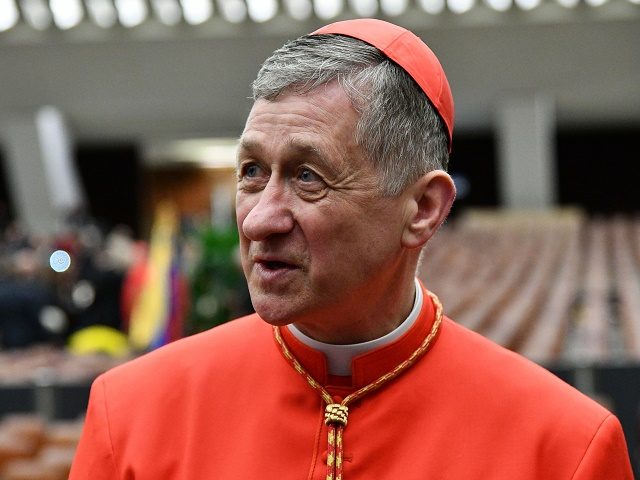Chicago archbishop Blase Cupich has once again downplayed the centrality of abortion as moral and political issue, insisting it must be seen as just one element of “a consistent ethic of life.”
In an op-ed Wednesday in Chicago Catholic, the newspaper of the Archdiocese of Chicago, Cardinal Cupich repeated arguments against prioritizing the abortion issue when considering “how our faith should inform our politics and our voting decisions.”
Recently, the cardinal faced off against leaders of the U.S. bishops conference who insisted that the faithful must understand that abortion is the “preeminent priority” when decided on whom to vote for. Having lost that battle, the cardinal wrote his own op-ed to keep pushing the idea that abortion is no worse than any other social issue.
On average, over 2,700 unborn children are executed in the womb every day in the United States. One can only wonder what Cardinal Cupich would say if 2,700 migrants were rounded up and dismembered on a daily basis. Would this become a preeminent issue, or would he insist that it must be contextualized and balanced against other social issues?
To back up his argument, Cardinal Cupich cited a former archbishop of Chicago, the late Cardinal Joseph Bernardin, who is credited with creating the “seamless garment” moral theory, which approached all social evils as part of a unitary whole rather than addressing them individually.
A consistent ethic of life “joins the humanity of the unborn infant and the humanity of the hungry; it calls for positive legal action to prevent the killing of the unborn or the aged and positive societal action to provide shelter for the homeless and education for the illiterate,” Bernardin wrote in 1984.
Bernardin argued that his approach “will not erode our crucial public opposition to the direction of the arms race; neither will it smother our persistent and necessary public opposition to abortion,” but in point of fact, that is exactly what happened.
By introducing a series of elements that could not garner unanimous support, purveyors of this approach debilitated the Catholic pro-life effort in the United States by splintering the movement into factions. Those who had been united in their monolithic opposition to the evil of abortion found themselves divided on other issues such as capital punishment, healthcare, welfare, gun control, national defense and the minimum wage.
Although couched in moral terms, Cardinal Bernardin’s theory was essentially political. He was a Democrat at a time when his party had moved to embrace abortion on demand, while then-President Ronald Reagan had adopted an uncompromising pro-life stance in defense of the unborn. Only by extending the definition of what it meant to be “pro-life” could Bernardin defend the Democratic platform as a viable moral option for serious Catholics.
The new standard-bearer for the seamless garment approach to life is Bernardin’s successor as archbishop of Chicago, Cardinal Cupich, another toady for the Democratic Party.
In a signed 2015 op-ed in the Chicago Tribune, Archbishop Cupich listed a series of social ills that people should find just as loathsome as ripping apart unborn children and selling their organs.
As appalling as it is “to speak freely of crushing a child’s skull to preserve valuable body parts,” Cupich wrote, we should be “no less appalled by the indifference toward the thousands of people who die daily for lack of decent medical care; who are denied rights by a broken immigration system and by racism; who suffer in hunger, joblessness and want; who pay the price of violence in gun-saturated neighborhoods; or who are executed by the state in the name of justice.”
By insisting on the moral equivalency of many different societal problems, Cupich reduced the heinous offense of slaughtering the unborn and trading in their body parts to just another social ill, no worse than unemployment or a broken immigration system.
The archbishop of Philadelphia, Charles J. Chaput, was quick to offer fraternal correction to his misguided brother bishop, penning his own essay titled “There Is No Equivalence.”
Attempts to equate the intentional taking of human life through abortion with other social justice issues – such as poverty, racism, and unemployment – are wrongheaded and deceptive, he said.
“The deliberate killing of innocent life is a uniquely wicked act,” Chaput wrote. “No amount of contextualizing or deflecting our attention to other issues can obscure that.”
Nearly all Catholic dioceses in the United States – including his own – spend far more time and talent on providing social services to the poor rather than on opposing abortion, Chaput noted, yet the fact remains that “children need to survive the womb before they can have needs like food, shelter, immigration counseling and good health care.”
“Humanity’s priority right – the one that undergirds all other rights – is the right to life,” Chaput argued, and being “right” on other matters of social justice “can never excuse a wrong choice regarding direct attacks on innocent human life.”
As Archbishop Joseph Naumann, chairman of the U.S. Bishops’ Committee on Pro-Life Activities, stated in 2017, abortion is the great “moral crisis of our time,” overshadowing immigration, health care, and capital punishment.
While many other moral issues merit attention from the bishops, Naumann said, it would be a mistake to treat them as if they had the same weight, noting that the “vast majority of bishops” understand that abortion is the preeminent moral crisis of our time.

COMMENTS
Please let us know if you're having issues with commenting.